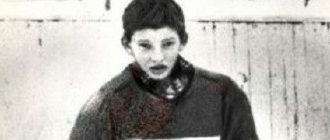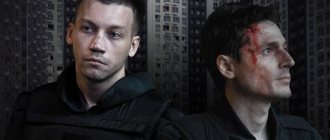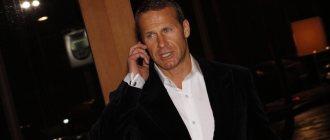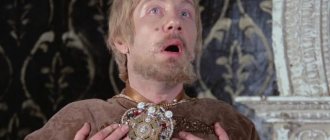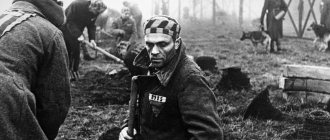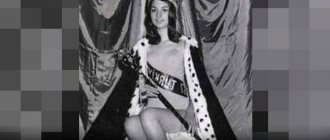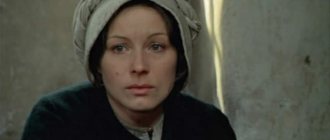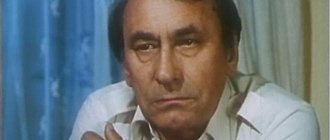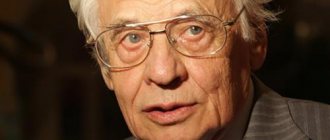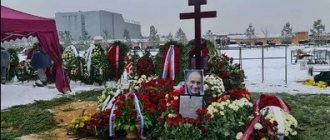| Vladislav Strzhelchik | |
| People's Artist of the USSR V.I. Strzhelchik | |
| Birth name | Vladislav Ignatievich Strzhelchik |
| Date of Birth | January 31, 1921(1921-01-31)[1] |
| Place of Birth |
|
| Date of death | September 11, 1995(1995-09-11) (age 74) |
| A place of death |
|
| Citizenship | RSFSR → USSR → Russia |
| Profession | actor, theater teacher |
| Years of activity | 1938—1993 |
| Theater | BDT |
| Awards | 1985 |
Vladislav Ignatievich Strzhelchik
(January 31, 1921, Petrograd - September 11, 1995, St. Petersburg) - Soviet and Russian theater and film actor, teacher. Hero of Socialist Labor (1988). People's Artist of the USSR (1974).
Biography[ | ]
Vladislav Strzhelchik was born on January 31, 1921 in Petrograd (now St. Petersburg). His father Ignatius Petrovich (Polish: Ignacy Strzelczyk) came from Poland and settled in St. Petersburg at the beginning of the 20th century.
In 1929-1938 he studied at a ten-year school in Leningrad.
In 1938, he was accepted into the studio at the Bolshoi Drama Theater named after M. Gorky (BDT) and in the same year became an actor at the Bolshoi Drama Theater (from 1992 - named after G. Tovstonogov), where he worked all his life. It was possible to graduate from the studio only in 1947. Drafted into the Red Army in 1940, during the Soviet-Finnish War. In an interview with the magazine “Soviet Screen” (1979, No. 5), he stated: “ I began my service in the 24th Corps Artillery Regiment. In the morning, as expected, a young soldier served, and in the evening he participated in the preparation of army ensemble programs
" After the start of World War II, he served in the infantry, was on the front line, and participated in various army ensembles[2].
Among the best roles played on the theater stage is Tsyganov
in “Barbarians” by M. Gorky,
Kulygin
in “Three Sisters” by A. P. Chekhov,
Gregory Solomon
in “The Price” by A. Miller,
Adrian Fomich
in the play “Three Bags of Weedy Wheat” based on the story by V. F. Tendryakov, comic role
Prince Vano Pantiashvili
in “Khanum” by A. A. Tsagareli,
Barney Cashman
in the play “The Last Ardent Lover” based on the play by N. Simon[3].
He made his film debut in 1942 in a cameo role in the film “Mashenka”.
He was engaged in teaching activities: in 1959-1968 he taught acting at the Leningrad Institute of Theater, Music and Cinema (now the Russian State Institute of Performing Arts), in 1966-1975 - at the Leningrad Institute of Culture (since 1970 - at the department of musical directing).
Strzhelchik’s grave on the Literatorskie Mostki in St. Petersburg.
In 1986-1991 - member of the board, from October 1991 - secretary of the board of the Union of Theater Workers of the RSFSR[4].
With the death of G. A. Tovstonogov in 1989, he began to play less in the theater. Later, during rehearsals and performances, he began to forget the text, so he decided to leave the stage[5].
He died in St. Petersburg on September 11, 1995 at the age of 75 after a long battle with a brain tumor. He was buried in St. Petersburg on the Literary Bridge of the Volkovsky Cemetery. The tombstone (sculptor M. T. Litovchenko, architect T. P. Sadovsky) was created in 1996.
Family[ | ]
| Check information. It is necessary to check the accuracy of the facts and reliability of the information presented in this article. There should be an explanation on the talk page. |
- Father - Ignatiy Petrovich Strzhelchik (1876 - 1956), engineer
- Mother - worked at the Hermitage
- Brother - Pyotr Ignatievich Strzhelchik (1916 - 1997), WWII participant, engineer-colonel
- First wife - Olga Mikhailovna Smirnova (died), operetta artist
- Daughter - Marina Vladislavovna Strzhelchik-Smirnova
- Second wife - Lyudmila Pavlovna Shuvalova (born November 13, 1926), actress and director of the Bolshoi Drama Theater
Illegitimate children:
- Son - Evgeny Vladislavovich Volkov (born 1954), Associate Professor of the Department of Astrophysics at St. Petersburg State University
- Son - Dmitry Alekseevich (Vladislavovich) Isaev (born January 23, 1973), theater and film actor[6][7]
- Son - Ilya Vladislavovich Kovrizhnykh (born January 15, 1981), theater and film actor
- In the early 90s of the twentieth century, Strzhelchik had another child, a son. Together with his mother, he attended the farewell to his father.
Before the war, before the birth of his daughter Marina, V. Strzhelchik had a daughter, who worked as a saleswoman in Passage for a long time after the war.
Addresses in Leningrad[ | ]
- 1921-1950s - Gogol Street, 8
- 1950s—1971 — Basseynaya street, 59
- 1971-1990 - Basseynaya street, 47
- 1990-1995 - Petrovskaya embankment, 4.
Facts from the life of Strzhelchik
Vladislav was recognized as a multifaceted actor.
He masterfully played any role, completely getting used to the character. This man’s talent was the envy of many accomplished artists. Almost every director dreamed of collaborating with Strzelchik. However, Vladislav did not agree to all proposals.
Photo: biografii
The actor's filmography consists of 126 projects. Vladislav has acted in films and TV series for 50 years. During this time, he received many complex roles that required professional skills. But Vladislav coped with everything. And this is largely the merit of his wife Lyudmila, who was with him until his death.
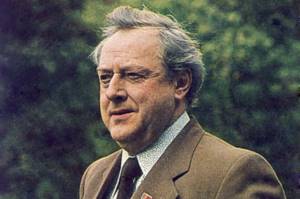
Photo: biografii
Titles and awards[ | ]
- Hero of Socialist Labor (1988)
- Honored Artist of the RSFSR (1954)
- People's Artist of the RSFSR (1965) - for services in the field of Soviet theatrical art
[8] - People's Artist of the USSR (1974)
- State Prize of the RSFSR named after the Vasilyev brothers (1971) - for the role of General Kovalevsky
in the TV series “His Excellency’s Adjutant” - Order of Lenin (1988)
- Order of the October Revolution (1981)
- Order of the Patriotic War, II degree (1985)
- Medal "For the Defense of Leningrad" (1943)
- Medal "For Military Merit" (1944)
- Medal "For victory over Germany in the Great Patriotic War of 1941-1945" (1946)
- Medal "Thirty Years of Victory in the Great Patriotic War 1941-1945"
- Medal "Forty Years of Victory in the Great Patriotic War 1941-1945"
- Medal "In memory of the 250th anniversary of Leningrad" (1957)
- International Dramatic Society Award for Contribution to the Development of Dramatic Art Transcending International Barriers (1989)
- Prize of the City Hall of St. Petersburg (1995)
- The highest theater award of St. Petersburg “Golden Sofit” (1995, posthumously)
Creativity[ | ]
Theater roles[ | ]
- 1946 - “Much Ado About Nothing” by W. Shakespeare. Staged by I. Yu. Shlepyanov - Claudio
- 1948 - “Enemies” by M. Gorky. Staged by N. S. Rashevskaya - Grekov
- 1949 - “Girl with a Jug” by L. de Vega - Don Juan
- 1950 - “The Secret War” by V. S. Mikhailov and L. S. Samoilov. Production by PP Suslovich - Dmitry Kazin
- 1950 - “The Fault” by B. A. Lavrenev; directors A. V. Sokolov and I. S. Sonne - Polevoy
- 1951 - “Yarovaya Love” by K. A. Trenev; director I. S. Efremov - Yarovoy
,
dance director - 1951 - “The Snow Maiden” by A. N. Ostrovsky; production by I. S. Efremov - Lel
- 1951 - “Dostigaev and others” by M. Gorky. Staged by N. S. Rashevskaya - Victor Nestrashny
- 1952 - “Apple Branch” by V. A. Dobrovolsky and Y. Smolyak; production by A. V. Sokolov and E. Z. Kopelyan - Volodya
- 1952 - “Ruy Blas” by V. Hugo. Staged by I. S. Efremov - Ruy Blaz
- 1953 - “Prologue” by A. Stein; production by A. V. Sokolov - Fedor
- 1953 - “The Servant of Two Masters” by C. Goldoni; production by G. G. Nikulin - Florindo Aretusi
- 1955 - “The Unveiled Miracle Worker” by G. Fielding - Monk Martin
- 1956 - “Cliff” after I. A. Goncharov - Raisky
- 1956 - “Nameless Star” by M. Sebastian. Staged by G. A. Tovstonogov - Grieg
- 1957 - “The Idiot” based on the novel by F. M. Dostoevsky. Staged by G. A. Tovstonogov - Ganya Ivolgin
- 1959 - “Barbarians” by M. Gorky. Staged by G. A. Tovstonogov - Tsyganov
- 1961 - “The Fourth” by K. M. Simonov. Staged by G. A. Tovstonogov - He
- 1962 - “The Divine Comedy” by I. Stock. Staged by G. A. Tovstonogov - Angel D.
- 1962 - “Woe from Wit” by A. S. Griboyedov. Staged by G. A. Tovstonogov - Repetilov
- 1963 - “The Career of Arturo Ui” by B. Brecht. Production by E. Axer - Actor
- 1965 - “Three Sisters” by A.P. Chekhov. Staged by G. A. Tovstonogov - Kulygin
- 1966 - “The Idiot” based on the novel by F. M. Dostoevsky (2nd edition). Staged by G. A. Tovstonogov - Epanchin
- 1966 - “The Truth! Nothing but the truth!!" D. Alya. Production by G. A. Tovstonogov - Overman
- 1967 - “Traditional collection” by V. S. Rozov. Staged by G. A. Tovstonogov - Alexander Mashkov
- 1969 - “King Henry IV” by W. Shakespeare. Staged by G. A. Tovstonogov - Heinrich Percy
- 1969 - “The Price” by A. Miller; director R. A. Sirota - Gregory Solomon
- 1970 - “The Third Watch” by G. A. Kapralov and S. I. Tumanov. Staged by G. A. Tovstonogov - Nikolai Bauman
- 1971 - “Toot, others and the major” by I. Erken. Staged by G. A. Tovstonogov - Professor Cipriani
- 1972 - “Khanuma” by A. A. Tsagareli. Staged by G. A. Tovstonogov - Prince Vano Pantiashvili
[9] - 1975 - “Three bags of weedy wheat” by V.F. Tendryakov. Staged by G. A. Tovstonogov - Adrian Fomich
- 1976 - “Summer Residents” by M. Gorky. Staged by G. A. Tovstonogov - Shalimov
- 1978 - “The Bourgeois” by M. Gorky. Staged by G. A. Tovstonogov - Teterev
- 1978 - “The Pickwick Club” by Charles Dickens. Staged by G. A. Tovstonogov - Sam Weller
- 1980 - “Wolves and Sheep” by A. N. Ostrovsky. Staged by G. A. Tovstonogov - Berkutov
- 1982 - “Amadeus” based on the play by P. Schaeffer. Staged by G. A. Tovstonogov and Yuri Aksyonov - Salieri
- 1985 - “The Last Ardent Lover” by N. Simon. Staged by G. A. Tovstonogov - Barney Cashman
- 1985 - “Simplicity is enough for every wise man” by A. Ostrovsky. Staged by G. A. Tovstonogov - Gorodulin
- 1987 - “At the Lower Depths” by M. Gorky. Production by G. A. Tovstonogov - Actor
- 1993 - “Ghosts” by E. de Filippo. Staged by T. N. Chkheidze - Pasquale
Teleplays[ | ]
- 1952 - Fault - Lieutenant Vladimir Polevoy
- 1953 - Enemies - mechanic Alexey Grekov
- 1953 - Lyubov Yarovaya - dance conductor
(uncredited) - 1953 - Servant of Two Masters - Florindo Aretusi
- 1954 - Two brothers
- 1963 - The Winter of Our Anxiety - Richard Walder
- 1963 - The Avenger - Paul Riedel
- 1963 - The Enchanted Wanderer - Prince
- 1963 - Rembrandt - Banning Cook
- 1964 - I believe in you
- 1965 - Rico Brothers - Rico
- 1965 - Faithful Robot; according to Art. Lemu; director I. Rassomakhin - Klempner
- 1965 - Fear and Despair in the Third Empire - Fey, Advisor
- 1965 - The Promise of Happiness - Bashilov
(short story “Rainy Dawn”),
doctor
(short story “White Rainbow”) - 1966 - Theater meetings of the Bolshoi Drama Theater in Moscow - presenter
- 1966 - Hut on the Great Trail
- 1967 - Travelers
- 1967 - Fourth
- 1968 - At-two... and queens! —Lepus Timidus
- 1968 - Courage
- 1968 - Before the Storm - Ivan Kolomiytsev
- 1968 - Last days [10] - Nicholas I
- 1968 - Prince Napoleon - Comte de Morny
- 1969 - Who is he?
- 1969 - The truth! Nothing but the truth! — Senator Lee Oberman
- 1969 - Death of Wazir-Mukhtar; according to Yu. N. Tynyanov; directors: R. A. Sirota, V. E. Receptor - Chaadaev
- 1970 - Twenty-seventh incomplete - Viktor Nikolaevich Kartashov
- 1971 - Career Arturo Ui - actor
- 1971 - Midnight Robbery - Robber
- 1971 - Fiesta; based on the novel by E. Hemingway “The Sun Also Rises”; director S. Yu. Yursky - Michael Kemble
- 1972 - 31st department - former employee of the 31st department
- 1973 - Toot, others and the major - Professor Cipriani
- 1978 - Midnight Robbery - Robber
- 1978 - Colonel Shaber - Colonel Shaber
- 1978 - Khanuma - Prince Vano Pantiashvili
- 1980 - Exit from the case
- 1981 - The Artamonov Case - Ilya Artamonov
- 1982 - Mont-Ariol - William Andermath
- 1986 - Equal to four Frances
- 1986 - Bolshoi Drama Theater thirty years later - Barney Cashman
(scene from the play “This Ardent Lover”) - 1989 - The Last Ardent Lover - Barney Cashman
Filmography[ | ]
- 1942 - Mashenka - White Finnish officer
(uncredited) - 1949 - Academician Ivan Pavlov - high school student
(uncredited) - 1957 - Baltic Glory - Anton Sergeevich Baturin
- 1957 - It Happened on Nekrasovskaya (short film) - artist Kistyansky
- 1957 - Next to us - shop manager Mikhail Alekseevich Zybin
- 1958 - Andreika - officer
(uncredited) - 1958 - In the days of October - adjutant of Klepikov
- 1958 - Kochubey - episode
(uncredited) - 1959 - Dostigaev and others - Viktor Nestrashny
- 1960 - Resurrection - Count Schönbrock
(uncredited) - 1961 - Baltic sky - Gromeko, military doctor
- 1961 - Vasily Dokuchaev - Vitaly Andreevich, secretary of the minister
- 1964 - Garnet bracelet - Nikolai Nikolaevich Mirza-Bulat-Tuganovsky
- 1964 - Dream - Nicholas I
- 1965 - Death of the squadron - prince, lieutenant, Knoris
- 1965 - What should we call you now? - General Bruno Gottburg, aka Alphonse Correl
- 1965 - The Third Youth (USSR, France) - Nicholas I
- 1965-1967 - War and Peace - Napoleon I
- 1966 - On the wild coast - director of the institute
(uncredited) - 1967 - Spring on the Oder - Colonel Semyon Semyonovich Krasikov
- 1967 - General Rakhimov - SS Brigadefuhrer Fricke
- 1967 - Green Carriage - Nicholas I
- 1967 - Major Whirlwind - Berg
- 1967 - Sofya Perovskaya - Alexander II / investigator
- 1968 - Our friends - Kapilitsyn
- 1968 - Touches to the portrait of V. I. Lenin - Doctor Grakhovsky
- 1968-1971 - Liberation - General Antonov
- 1969 - Adjutant to His Excellency - General Kovalevsky
- 1969 - He was not alone - captain of a Norwegian ship
- 1969 - Old Acquaintance - episode
- 1969 - Tchaikovsky - Nikolai Rubinstein
- 1970 - The end of the chieftain - chieftain Dutov
- 1970 - Collapse of the Empire - Protopopov
- 1970 - Peace to huts - war to palaces - Vladimir Vinnichenko
- 1970-1971 - The Crown of the Russian Empire, or Elusive Again - Pan Borislav Steshalsky, aka Vladimir Sukhorukov, aka Felix Reutner, aka Prince Semyon Pukhovdulsky, aka Count Stepan Naryshkin
- 1972 - Courtesy visit - Prefect of Pompeii
- 1972 - Labeled Atom - Pyotr Mikhailovich Brunov, Colonel General
- 1972 - Privalov's millions - Alexander Pavlovich Polovodov
- 1973 - Origins - diplomat Matvey Krupnov
- 1973 - My destiny - Gennady Aleksandrovich Barabanov, Lyudmila’s father
- 1973 - Open Book - Valentin Kramov
- 1974 - Dear Boy - McDonnell, Gangster Chief
- 1974 - The Tale of the Human Heart - Ilya Kapitonovich, surgeon, official
- 1974 - Straw Hat - Antoine Petitpierre Nonancourt, gardener, Fadinard's father-in-law
- 1974-1977 - Blockade - architect Fyodor Vasilyevich Valitsky
- 1975 - Star of Captivating Happiness - Count Laval
- 1976 - Always with me... - Andrey Ilyin
- 1976 - Liberation of Prague - General Antonov
- 1976 - The Tale of an Unknown Actor - Mikhail Tverskoy
- 1976 - Crime - Karetnikov
- 1976 - Theater stories (short) - Tragedian
- 1977 - Marriage - Scrambled Eggs
- 1977 - Funny people! — Pierre, bribe-taking official
- 1977 - Front behind the front line - General Antonov
- 1978 - Extra people
- 1978 - Father Sergius - Nicholas I
- 1978 - Farewell Mazurka - Alexander II
- 1979 - Poem about wings - Tupolev
- 1980 - Pious Martha - Don Gomez
- 1980 - My dad is an idealist - Sergei Yuryevich Petrov
- 1981 - Facts of the past day - Vasily Maksimovich Sorogin
- 1981 - Two voices (short story “Dark Alleys”) - Nikolai Alekseevich, military man
- 1981 - Front behind enemy lines - General Antonov
- 1981-1982 - Young Russia - skipper Urquhart
- 1982 - Here is the window again... (short story “One Hundred Pianos”) - main role
- 1982 - Mont Oriol (film-play) - William Andermath
- 1982 - Treasure Island - Squire Trelawney
- 1984 - Time of Desires - Nikolai Nikolaevich, composer
- 1984 - Rest time from Saturday to Monday - Alexey
- 1984 - European History - Dr. Hayden
- 1984 - Following - Igor Alexandrovich
- 1984 - Lights - banker Populaki
- 1984 - Pericola - Panatelyas, Chief of Police
- 1986 - Exceptions without rules (film almanac) (short story “The Voice”) - neurologist
- 1986 - Face to face - Prince Evgeny Rostopchin
- 1986 - The Secret of the Snow Queen - The Baron Who Isn't There
- 1987 - Midshipmen, forward! — Lestok
- 1987 - Corral (USSR, Syria) - General George Bell
- 1991 - Sukhovo-Kobylin case - Arseny Andreevich, Governor General
- 1991 - Crazy - Cuckold General
- 1992 - Tartuffe - Orgone
- 1993 - Vladimir the Holy - Vladimir Svyatoslavich
- 1993 - Provincial benefit performance - tragedian
Voiceover[ | ]
- 1970 - Franz Liszt. Dreams of Love" - Emperor Nicholas I
(role of S. I. Ivanov)
Participation in films[ | ]
- 1972 — “First of all, theater” (documentary)
- 1988 - “Live, think, feel, love...” (documentary)
Lyudmila was aware of her husband's adventures
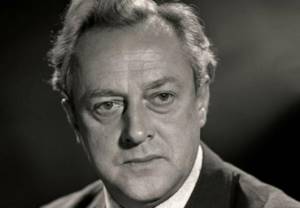
But Vladislav Ignatievich looked for inspiration outside the family. He was distinguished by passion, increased emotionality, often got carried away and started affairs on the side. Lyudmila Shuvalova was aware, but showed calmness regarding her husband’s adventures. Here's how she talked about it:
It would be strange if such an interesting man did not have fans, but due to their intelligence, as a rule, they did not cause us any particular inconvenience...
Vlad adored women and called each one “my sunshine” - nothing less. It cost him nothing to charm the lady, telling her a bunch of compliments. I knew about his hobbies, but I was smart enough to turn a blind eye to them: an actor sometimes needs a feeling of falling in love, it helps him create this or that image...
Russian car owners will see an increase in the price of compulsory motor liability insurance by almost a third
Natural fabrics and no to leather bags. How to dress in hot weather for the office
After his dismissal from the theater, Dmitry Dyuzhev was left without a main source of income
I was even flattered that women liked him. The main thing is that I knew that my husband really values our way of life, and all hobbies are fleeting, superficial and do not in any way affect our relationship with him. He didn’t give me any clues: he remained gentle and attentive, never stayed late without warning, called a hundred times a day.
Notes[ | ]
- ↑ 12
Strzhelchik Vladislav Ignatievich // Great Soviet Encyclopedia: [in 30 volumes] / ed. A. M. Prokhorov - 3rd ed. - M.: Soviet Encyclopedia, 1969. - Interview with the actor in the magazine “Soviet Screen”
- ↑ 1 2 Pavlova I.
Named after Strzhelchik // St. Petersburg Gazette. — 2021. — February 4. - Strzhelchik Vladislav Ignatievich (unspecified)
. Movie constellation: Author's project of Sergei Nikolaev. Access date: January 5, 2013. - And life, and tears, and love: Vladislav Strzhelchik’s widow, actress and director Lyudmila Shuvalova: “At one of the rehearsals of Macbeth, Vladik forgot the text. He spoke again and forgot again, and then looked into the audience and said sadly: “That’s all with me!” // “Gordon Boulevard”, online publication. - 2010. - No. 36 (280). - September 7.
- Dmitry Isaev about “Goddesses”, the restaurant business and working as a massage therapist. VIVA! 01/23/2012
- The widow of Vladislav Strzhelchik about her husband’s illegitimate son: “Vladik stubbornly denied his paternity” (unspecified)
. Caravan of stories (July 2015). Access date: February 5, 2016. - Decree of the Presidium of the Supreme Soviet of the RSFSR dated April 23, 1965 “On awarding honorary titles of the RSFSR to artists of the Leningrad Academic Bolshoi Drama Theater named after M. Gorky”
- Film adaptation of the play “Khanuma” by the Lenfilm film studio on the official channel of the studio on YouTube
- Channel Five Russia.
“The Last Days”, teleplay based on the play by M. Bulgakov.
LenTV, 1968 (unspecified)
(September 11, 2015). Date accessed: April 9, 2021. - Encyclopedia of St. Petersburg, memorial plaque to V. I. Strzhelchik (unspecified)
.
A dynasty that few people know about
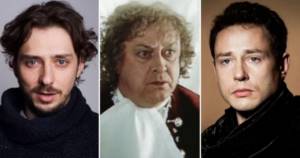
Actor Vladislav Strzhelchik was especially remembered by the general public for the following roles:
- in the epic film “War and Peace” he played the role of Napoleon Bonaparte;
- in “The Straw Hat” he portrayed the father of the bride;
- in the film “Midshipmen, forward!” - court physician Lestocq.
He also played many roles in the theater.
Few know about the acting dynasty, the founder of which is Vladislav Strzhelchik, and whose successors are his two illegitimate sons. After all, he refused to recognize them and give his last name. The only recognized child was the daughter born in Vladislav Ignatievich’s first marriage. In the second, the artist did not have children, but on his side three boys were born. One of them was given his teaching talent, and two were given his acting talent.
Scientists have found out what are the disadvantages of a 5-hour working day
The secret of money: wisdom is the state of survival, intelligence is the ability to survive
A register of professions for which demand is falling may appear in Russia
We are talking about Evgeny Volkov, Dmitry Isaev and Ilya Kovrizhnykh, each of whom achieved success in life independently, without using the famous surname of their illustrious father.
Literature[ | ]
- Ryzhova V.
Vladislav Strzhelchik // Actors of Soviet cinema. — Vol. 9. / Ed. A. M. Sandler. - M.: Art, 1973. - P. 268-283. - Zabozlaeva T. B.
Vladislav Strzhelchik / Leningrad State Institute of Theater, Music and Cinematography.. - L.: Art, 1979. - 192, [42] p. — (Masters of Soviet theater and cinema). — 25,000 copies. (in translation) - Tolubeev A.
In search of Strzhelchik: A novel-interview about the life and death of an artist / STD RF. - St. Petersburg: Nestor-History; Publishing house of the theater book ART (“Artist. Director. Theater”). - 2008. - 440 p. — ISBN 978-5-940472-22-3.
Links[ | ]
- Unofficial website of the actor
- About Vladislav Strzhelchik on the rusactors website
- Vladislav Strzhelchik on the pages of Vladimir Recepter’s book ““This life is incorrigible...”: Notes of a theatrical renegade”
- Vladislav Strzhelchik on the pages of Vladimir Recepter’s book “Nostalgia for Japan: a tour novel” 1
| Thematic sites |
|
| Dictionaries and encyclopedias |
|
| Regulatory control |
|
